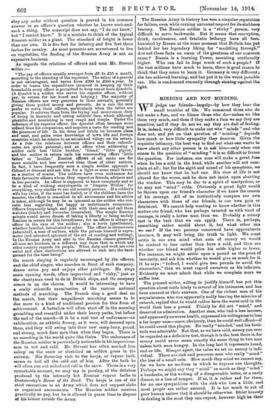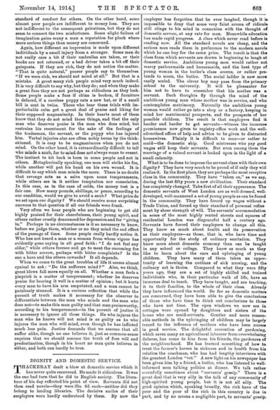MINDING AND NOT MINDING.
w-E judge our friends—largely—by how they bear the small troubles of life. We commend those who do not make a fuss, and we blame those who do—unless we like them very much, and then if they make a fuss we say they are sensitive, and if they do not we say they are dull of feeling. It is, indeed, very difficult to make out who " minds " and who does not, and yet on that question of " minding " depends how much or how little sympathy they deserve. Given the requisite intimacy, the best way to find out what one wants to know about any other person is to ask him—only when one comes to the question of " minding " it is so difficult to frame the question. For instance, one man will make a great fuss when he has a cold in the head, while another will not com- plain at all; but for the sight and sound of his symptoms, we should not know that he bad one. His view of life is not altered for the worse, and be does not insist upon shutting the window. This may be due to a spirit of martyrdom, or he may not " mind " colds. Obviously a great light would be thrown upon our friend's character if we knew the reason of his courage. All of us instinctively compare our own characters with those of our friends, to our own gain or detriment. We cannot help wanting to know whether in this matter our friend, who has perhaps taunted us with want of courage, is really a better man than we. Probably a money test is the best that we can apply. There is, perhaps, something rather sordid about it, but what other can we use If the two persons concerned have approximate incomes, it may well bring the truth to light. We must settle in our own mind what sum of money we would be content to lose rather than have a cold, and then see whether our friend would price his colds higher or lower. For instance, we might settle upon a pound as the price of immunity, and ask him whether he would give as much for it. If he says : " Indeed, I would give two pounds to avoid the discomfort," then we must regard ourselves as his inferiors. Evidently we must admit that while we complain more we suffer less.
The present writer, willing to justify himself, has put this question about colds lately to several of his intimates, and has been amazed at their answers. One of the richest men of his acquaintance, who was apparently nobly bearing the miseries of catarrh, replied that be would rather have the worst cold in the world than lose a pound. Plainly he did not " mind," and deserved no admiration. Another man, who had a less income, and apparently no worse health, expressed his willingness to lose a far larger sum—more, obviously, than he could well afford—if he could avoid this plague. He really "minded," and his forti- tude was admirable. Not that, as we have said, money can ever be regarded as a definitive test, though it is the best there is, for money could never mean exactly the same thing to two men unless both were hungry. In the long last it represents bread, and so life. Ranger apart, the value we set on money is indi- vidual. There are rich and generous men who really " mind " the loss of a small coin. How much they mind we cannot say, for we have no medium in which to express our thoughts. Perhaps we might say they " mind " as much as they " mind" a headache, or the writing of a disagreeable letter, or a nasty dinner, or a loss of temper. If so, it is rather sad for them, for no one sympathizes with the rich who lose a little, and most people are rather amused. It is too much to ask of poor human nature that it should be otherwise. Strict honesty in dealing is the mcst they can expect, however high be their
standard of conduct for others. On the other hand, some almost poor people are indifferent to money loss. They are not indifferent to the consequent privations, but they do not seem to connect the two misfortunes. Some slight failure of imagination gains many a man a reputation for pluck where more serious things than money are concerned.
Again, how different an impression is made upon different individuals by a small injury from a stranger. Some men do not really care a bit if their umbrellas are taken, or their books are not returned, or a bad driver takes a bit off their gateposts. If they are rich, they do not notice the matter. " That is quite natural," poorer people say to themselves. "If we were rich, we should not mind at all." But that is a mistake. A great many rich people mind very much indeed. It is very difficult to say why, but they do ; and when they make a great fuss they are not perhaps as ridiculous as they look. Some people make a fuss if china is broken, if furniture is defaced, if a careless puppy eats a new hat, or if a small bill is sent in twice. Those who bear these trials with im- perturbable calm get a great deal of praise and liking for their supposed magnanimity. In their hearts most of them know that they do not mind these things, and that the only man who deserves praise is the man who does mind, but restrains his resentment for the sake of the feelings of the tradesman, the servant, or the puppy who has injured him. Verbal injuries also are often nobly borne by the thick- skinned. It is easy to be magnanimous when you do not mind. On the other band, it is extraordinarily difficult to tell who minds a snub, for to mind does not always mean to resent. The instinct to hit back is born in some people and not in others. Metaphorically speaking, one man will strike his foe, while another will put his hand on his own wound. It is difficult to say which man minds the more. There is no doubt that revenge acts as a salve upon some temperaments, while others see in it neither temptation nor consolation. In this case, as in the case of colds, the money test is a fair one. How many pounds, shillings, or pence, according to our condition, would we give to avoid a snub ? What price do we set upon our dignity ? We should receive some surprising answers to that question if all our friends were frank.
Very often we hear people who are beginning to get old highly praised for their cheerfulness, their young spirit, and others rather cruelly denounced for depression and for "giving in." Perhaps in no circumstances is it so necessary to know, before we judge them, whether or no they mind the sad effect of the passage of time. Some people really hardly notice it. Who has not heard a man or a woman from whom vigour has evidently gone saying in all good faith : "I do not feel any older," while others foresee and go to meet the oncoming foe with bitter sorrow, perhaps with bitter complaints ? Is the one a hero and the others cowards? It all depends.
When we come to the great troubles of life it seems almost cynical to ask : "Do the sufferers mind ? " Also, we think, great blows fall more equally on all. Whether a man feels a pinprick is a matter of temperament ; whether he deserves praise for bearing it well is a matter of opinion ; but it hurts every man to have his arm amputated, and a man cannot be painlessly stunned. It is a curious reflection that while the pursuit of truth makes it necessary for the observer to differentiate between the man who minds and the man who does not—to make this man guilty and that man praiseworthy, according to his temperament—in the pursuit of justice it is necessary to ignore all these things. He who injures the man who he knows will not mind is as guilty as he who injures the man who will mind, even though he has inflicted much less pain. Justice demands that we assume that all suffer alike, though no one believes it, just as common-sense requires that we should assume the truth of free will and predestination, though in his heart no man quite believes in either, and both can hardly be true.







































 Previous page
Previous page